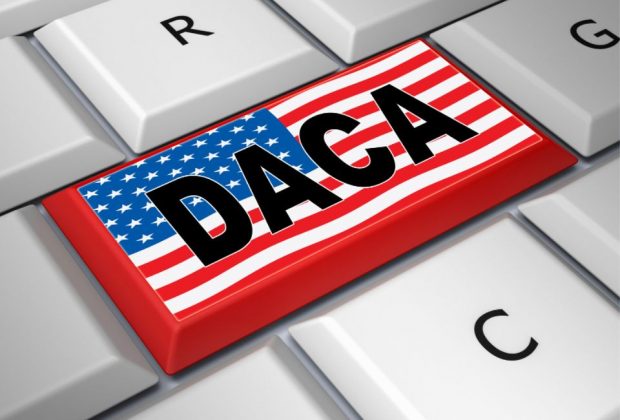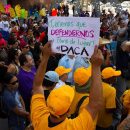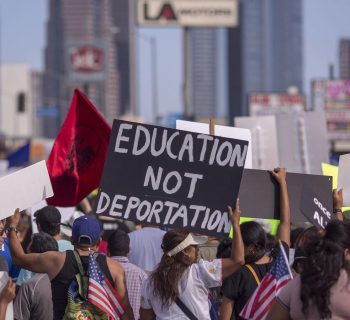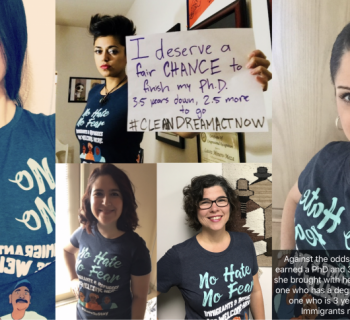Most of this year’s 100,000 undocumented high school graduates are currently ineligible for the policy.
Under current rules and court action, DACA is unavailable to most undocumented high school graduates. Absent Congress’ passing immigration reform for Dreamers, most undocumented graduates cannot legally enter the workforce, even if the DACA policy were open for new applicants. Without more states passing tuition equity legislation, many undocumented graduates also cannot access affordable higher education.
Study by FWD.us | MAY 25, 2022
FWD.us estimates that some 100,000 undocumented young people will graduate from high school this spring.1Part of the larger 2.8 million-strong Dreamer population, these undocumented students came to the U.S. as children, and have spent most of their lives in this country.2 With more than 600,000 K-12 undocumented students enrolled in U.S. schools, hundreds of thousands of future high school graduates will continue to face limited options for their futures without immigration relief. In fact, FWD.us estimates that at least 100,000 undocumented students will graduate from U.S. high schools each year for at least the next three years.
As undocumented high school seniors across the country prepare to receive their diplomas, most will encounter greater challenges than previous classes of undocumented graduates. Deferred Action for Childhood Arrivals (DACA), a DHS policy offering work authorization and deportation protections for undocumented individuals who entered the U.S. as children, has been life-changing for hundreds of thousands of Dreamers since its inception in 2012. And, as it has been for so many other undocumented high school graduates in recent years, such a policy holds transformative potential for future high school graduates. But now, only a quarter of this year’s undocumented high school graduates would be eligible for immigration relief through DACA under current rules.This is because the class of 2022 is one of the first graduating classes where the overwhelming majority of undocumented graduates are ineligible for DACA because they entered the U.S. after the DACA-required arrival date of June 15, 2007.
However, even the small share of this year’s undocumented high school graduates who might be eligible for DACA are limited in accessing its protections. Attempts by the Trump Administration to end DACA, combined with court orders interrupting access to new prospective DACA applicants, left a short window of about six months in 2021 for most of these DACA-eligible graduates to have applied. In fact, recent United States Citizenship and Immigration Services (USCIS) dataindicates that only 21,000 of the 611,000 total active DACA recipients are around high school graduation age (ages 16-20). Unfortunately, even those graduates fortunate enough to have received DACA during the limited periods of access for new applicants cannot count on its benefits in the future, as the courts prepare to rule on a lawsuit that could jeopardize the entire DACA policy.
DACA has had a transformational impact on both DACA recipients and the broader U.S. economy, allowing recipients to better support themselves and their families and more fully participate in their communities. Without DACA, however, undocumented high school graduates cannot legally work, leaving thousands of individuals barred from the U.S. labor force at a time when U.S. worker shortages have reached a record high. This also cuts off a significant source of income that these young adults could use to fund their higher education and professional training, in addition to supporting their families and building self-sufficiency.
“Around 43,000 of this year’s undocumented graduates will be prohibited from fully accessing in-state tuition rates despite being residents."
Thousands of undocumented graduates can’t access affordable college education
With most undocumented high school graduates barred from legally entering the workforce, higher education could present an additional pathway for many thousands of students. FWD.us estimates that more than four in ten (43%) of this year’s undocumented graduates live in one of 28 stateswhere they are denied full tuition equity, dramatically reducing many students’ ability to pay for higher education. In these states, around 43,000 of this year’s undocumented graduates will be prohibited from fully accessing in-state tuition rates despite being residents, even with most having attended public schools from an early age.
Undocumented students are also ineligible for federal financial aid, including loans and grants, which many students use to subsidize the extremely high cost of higher education. And, without the protection and benefits that DACA offers, many can’t obtain driver’s licenses in their state, a necessity for many traveling outside of cities to colleges. Without access to these supports, higher education would be prohibitively expensive and likely inaccessible for most undocumented students.
Experience makes clear that expanding access for tuition equity to undocumented students is smart and effective for students and for states, increasing higher education enrollment among undocumented immigrants and helping grow local workforces. For instance, in Colorado, the ASSET law has enabled undocumented students to access in-state tuition rates since 2013. Nearly 3,000 undocumented students have taken advantage of this policy so far.3
Several other states are considering tuition equity legislation, including Georgia, where FWD.us estimates that 30,000 college-aged students could immediately benefit along with an additional 1,500 high school graduates from the class of 2022. This would be a significant change for Georgia which, like, South Carolina, Alabama, and other states, explicitly prohibits undocumented students from receiving the same tuition rates as their fellow residents.
“Congress should immediately establish a pathway to citizenship for undocumented immigrants, including DACA recipients and Dreamers.”
Federal and state legislators should do more
This FWD.us analysis shows that tens of thousands of undocumented graduates are barred from accessing equitable tuition rates or receiving work authorization, severely limiting their career and education prospects. These barriers unnecessarily and unfairly limit undocumented graduates’ ability to participate in the workforce, grow the economy, and contribute to their communities. Additionally, it is a huge waste of years of K-12 education that states have invested in every student to prevent them from going further if they want to, and another cruel roadblock they face in the country they call home.
At the federal level, Congress should immediately establish a pathway to citizenship for undocumented immigrants, including DACA recipients and Dreamers. This would help provide certainty and opportunity to people who have grown up in the United States and want to continue building their future here. In particular, citizenship would allow greater access to the labor market for students who may need to work while attending school, and for graduates finishing college and building a career.
States can also provide certainty and opportunity to undocumented residents by allowing students who have gained most of their education in their state’s public school system to access in-state colleges at in-state tuition rates. Further, states should provide additional resources for recruitment of undocumented students to further their education and contribute their training to the local workforce.
Federal and state elected leaders have urgent work to do. The U.S. economy cannot afford to lose, perhaps permanently, this graduating class of undocumented students. Congress and the Biden Administration must ensure that undocumented high school graduates this year can legally support themselves and continue their education in the U.S.






